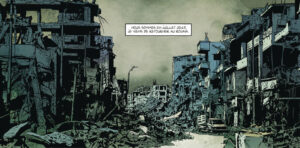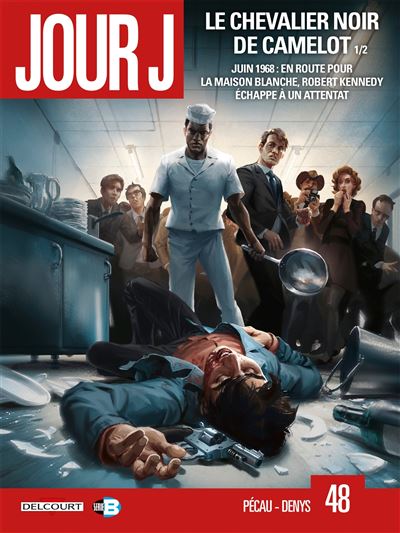The war in Syria has left the front pages of the newspapers but not the reality on the ground. With such a long conflict, how to inform oneself without losing one's sensitivity? The publisher Delcourt proposes a new path: Until Raqqa is the testimony of a fighter in the depths of violence.
The intimate tale of a freedom fighter

Until Raqqa is an intimate comic strip adapted from André Hébert's story. This French activist put his revolutionary ideas into practice by joining the war against Daesh. Initially, he was only a Parisian activist converted to wrestling by buying a Che t-shirt. The failure of the movements in France radicalized him. In addition, he feels professional frustration, no longer supporting the hierarchy. Using social networks, he discovered and then contacted the Kurdish resistance. Once in Syria, André keeps wanting to sink deeper and deeper into the country and go into battle. This need for the absolute gives the feeling of a search for martyrdom. Towards the end of the book, he admits to having a relationship of dependence on the adrenaline provided by danger.
To share this experience and get out of the documentary, it took all the talent of the cartoonist Nicolas Otero. He takes us with André from the start. His very realistic style is impressive. It transmits the fear of being killed around every corner. He also knows how to use onomatopoeias to show the hubbub of war. Nicolas Otero plays on the material of these onomatopoeia to give the impression of a stamp placed on the city. The colorist 1ver2anes reinforces the scary atmosphere by a very present blue-gray hue.
A summary of a forgotten war zone

Until Raqqa takes up codes of the initiation story. André reinvents himself by changing his geographical setting. In this new framework, the militant becomes a soldier and this change is marked by a change of name. Not speaking Arabic, the young man is lost. The screenwriter also makes the effort to leave the text in this alphabet. The reader is therefore just as lost as the main character. The screenwriter admits to being biased. With Until Raqqa, the reader follows a convert to the Kurdish popular revolution. He does not doubt the merits of his camp. The Kurds do not comment on any blunders and respect the rules of war. The reader still perceives the instrumentalization of the martyrs to make them models to follow.
Up to Raqqa is therefore easy to access because all the facts and places come from a personal story: by André the reader (re)discovers Daesh and the war in Syrian Kurdistan, Rojava. The training of the newcomer makes it possible to understand the decentralized functioning of this autonomous region. Daily life in combat is made of waiting… and diseases because Western bodies are not used to the water of the region. It does not hide the violence of Daesh and the horror suffered by civilians, especially women. Without being gory, images also mark by the strength of the text around. The army of Syrian Kurdistan is revealed by the heroic figures of the female soldiers that the Frenchman discovers. This parity society integrates them into the army for the revolution and the fight against patriarchy. The dossier at the end of the volume completes this experience with a map, texts on the Syrian Democratic Forces and on André Hébert's return to France.
Until Raqqa makes it possible to understand the complex Syrian conflict by following a Frenchman, a man like any other having nevertheless chosen one day to fight for his ideas. The book does not seek objectivity but delivers a warlike and political experience. Until Raqqa shows above all the horror of Daesh martyring its people.





































